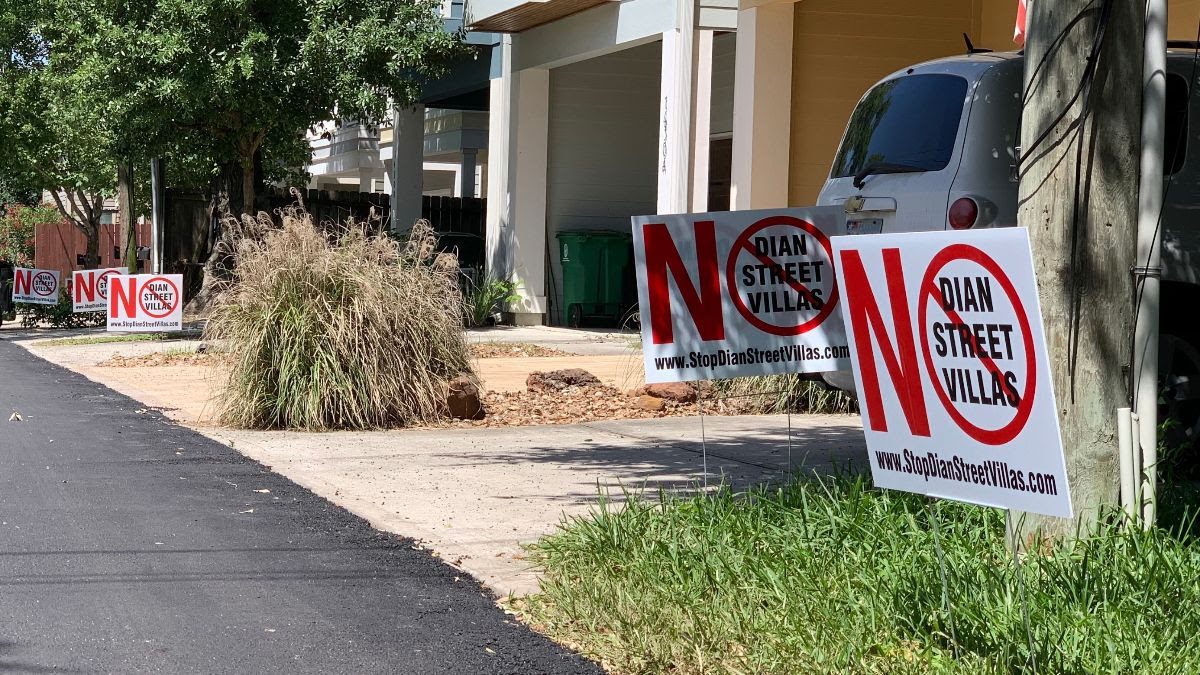If you’re living in “affordable housing,” you’re probably surrounded by poverty. It’s not supposed to be this way. When the poorest people are crowded in the least hospitable neighborhoods, it results in a lower standard of living. Ideally, subsidized housing would be constructed in areas with fewer poor people and less racial concentration. When developers try to build affordable housing in better neighborhoods, however, residents resist. That’s how we end up with all the subsidized housing concentrated in certain census tracts. In the Houston Greenspoint area, for example, the only housing is subsidized housing. With each new “affordable housing project,” the high-poverty area becomes an even-higher-poverty area.
Affordable housing developers often face resistance when they attempt to build in high-opportunity areas, despite the substantial funding they receive from the federal government. Homeowners’ opposition can force developers to construct in low-opportunity areas, perpetuating disparities and limiting access to better living conditions.
Dian Street Villas is the exception. When developers proposed the project in 2020, Lone Star Legal Aid submitted comments for the federal tax credit. Not only is the location inside the 610 loop, but it’s in Shady Acres, in the Greater Heights. The Dian Street project offered a beacon of hope, providing 96 units of affordable housing in a rapidly gentrifying area. As usual, residents resisted, planting “Stop Dian Street Villas” signs in their yards and organizing a petition. In a rare win for affordable housing advocates, the Dian Street project was approved in 2021. Construction began in 2022, and now, in 2023, the complex is accepting tenants.
Ideally, affordable housing would offer a way out of poverty, not a trap door leading in. In this Shady Acres neighborhood, only 9% of the population lives below LSLA’s poverty threshold (229 people out of 2,734 below 200% of the federal poverty level). The area has experienced a significant surge in rental prices over the last six years. Median rents have risen from $1,197 to $1,446, making it increasingly unaffordable for individuals and families earning ordinary wages. The conditions at Dian Street are completely different from the Greenspoint area of Houston, where 72.6% of residents live below the same poverty threshold (2,113 out of 2,912 people in block group 3, census tract 5503.01). Instead of 96 units of affordable housing in the Dian Street complex, the Greenspoint-area tract includes more than 700 units in four separate low-income housing complexes. And unlike Dian Street, the Greenspoint area is racially concentrated: 93.4% of the residents are racial minorities (compared to only 36.6% in Shady Acres). Families are more likely to thrive in areas free of concentrated poverty and racial segregation.
“We work so hard to get people out of dangerous living conditions in low-opportunity areas,” says Kim Brown-Myles, the managing attorney of the Fair Housing Team. “Sadly, one of the patterns we see is: they just move into a similar building down the street. The conditions are nearly identical: high crime, poor public transportation, low-rated schools, and no real access to groceries or other necessities. Our clients find it difficult to give their children the opportunities they need to succeed in life. We feel like we’re really helping when we can get people into better living conditions, not just better buildings but better neighborhoods.”
The approval of the Dian Street Villas project was possible through the collaborative efforts of various stakeholders. Local residents, state officials, and advocacy organizations like Texas Housers and Lone Star Legal Aid came together to champion affordable housing and fair opportunities. Because the project’s funding relies on a Low Income Tax Credit, discrimination against housing-choice-voucher holders, commonly known as section-8 vouchers, is prohibited, ensuring equal access to housing for all.
Our Fair Housing Team’s achievements in securing approval for the Dian Street Villas project highlights their commitment to fostering equitable housing opportunities. By actively supporting affordable housing initiatives in high-opportunity areas, we work to combat the perpetuation of disparities and provide families with the chance to thrive in safe, affordable, and well-connected communities. The Dian Street Villas are a testament to the positive impact that collaboration and advocacy can have on transforming lives and creating brighter futures for all.
Lone Star Legal Aid (LSLA) is a 501(c)(3) nonprofit law firm focused on advocacy for low-income and underserved populations by providing free legal education, advice, and representation. LSLA serves millions of people at 125% of federal poverty guidelines, who live in 72 counties in the eastern and Gulf Coast regions of Texas, and 4 counties in Southwest Arkansas. LSLA focuses its resources on maintaining, enhancing, and protecting income and economic stability; preserving housing; improving outcomes for children; establishing and sustaining family safety, stability, health, and wellbeing; and assisting populations with special vulnerabilities, like those with disabilities, the aging, survivors of crime and disasters, the unemployed and underemployed, the unhoused, those with limited English language skills, and the LGBTQIA+ community. To learn more about Lone Star Legal Aid, visit our website at www.LoneStarLegal.org.
Media contact: media@lonestarlegal.org

